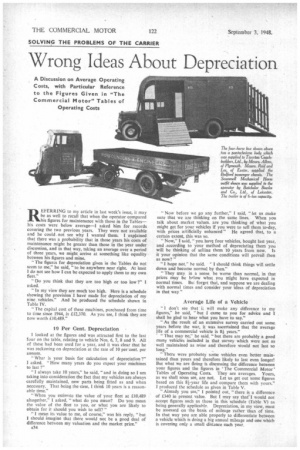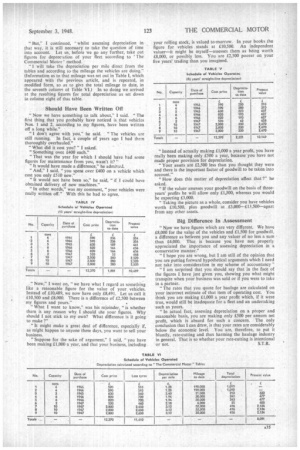Wrong Ideas About Depreciation
Page 52

Page 53

If you've noticed an error in this article please click here to report it so we can fix it.
A Discussion on Average Operating Costs, with Particular Reference to the Figures Given in "The Commercial Motor" Tables of Operating Costs
REFERRING to my article in last week's issue, it may be as well to recall that when the operator compared his figures for maintenance with those in the Tables— his costs were below average—I asked him for records covering the two previous years. They were not available and he could not see why I wanted them. I explained that there was a probability that in those years his costs of maintenance might be greater than those in the year under discussion, and in that way, taking an average over a period of three years, we might arrive at something like equality between his figures and mine.
The figurzs for depreciation given in the Tables do net seem to me," he said, to be anywhere near right. At least I do not see how I can be expected to apply them to my own fleet."
" Do you think that they are too high or too low ?" I asked.
" In my view they are much too high. Here is a schedule showing the provision I have made for depreciation of my nine vehicles." And he produced the schedule shown in Table IV.
"The capital cost of these machines, purchased from time to time since 1944, is £12,370, As you see, I think they are now worth £10,489."
10 Per Cent. Depredation I looked at the figures and was attracted first to the last four on the table, relating to vehicle Nos. 6, 7, 8 and 9. All of these had been used for a year, and it was clear that he was reckoning on depreciation at the rate of 10 percent. per annum.
" What is your basis for calculation of depreciation ?" I asked. "How many years do you expect your machines to last ?"
" I always take 10 years," he said, "and in doing so I am taking into consideration the fact that my vehicles are always carefully maintained, new parts being fitted as and when necessary. That being the case, I think 10 years is a reasonable time."
" When you estimate the value of your fleet at £10,489 altogether," 1 asked. 'what do you mean? Do you mean the value of the fleet to you, or what you are likely to obtain for it should you wish to sell? "
"1 mean its value to mc, of course," was his reply, "but I should imagine that there would not be a good deal of difference between my valuation and the market price."
*34 "Now before we go any further," 1 said, "let us make sure that we are thinking on the same lines. When you talk about market values, are you thinking of what you might get for your vehicles if you were to sell them to-day, with prices artificially enhanced" He agreed that, to a certain extent, this was so.
"Now," I said, " you have four vehicles, bought last year, and -according to your method of depreciating them you will be thinking of selling them 10 years from now. Is it your opinion that the same conditions will prevail then as now?"
" I hope not," he said. "I should think things will settle down and become normal by then."
"They may in a sense be worse than normal, in that prices may be below what you might have expected in normal times. Bu forget that, and suppose we are dealing with normal times and consider your ideas of depreciation in that way"
Average Life of a Vehicle "I don't see that it will make any difference to my figures," he said, "but I came to you for advice and I shall be glad to hear what you have to say."
'As the result of an extensive survey carried out some years before the war, it was ascertained that the average life of a commercial vehicle is 81 years." '
"That may tier he said, " hut there are probably a good many vehicles included in that survey which were not as well maintained as mine and therefore would not last so long."
"There were probably some vehicles even better maintained than yours and therefore likely to last even longer! But what we are doing is discussing the difference between your figures and the figures in The Commercial Motor' Tables of Operating Costs. They are averages. Yours, as we shall soon see, are not Let us get out some figures based on this 81-year life and compare them with yours." I produced the schedule as given in Table V.
"Already you see," I pointed out, "there is a difference of £340 in present value. But I may say thael would not accept figures such as those in this schedule (Table V) as being generally applicable. Depreciation, in my view, must be assessed on the basis of mileage rather than of time. In that way you are able properly to differentiate between a vehicle which is doing a big annual mileage and one which is covering only a small distance each year.
"But," I continued, "whilst assessing depreciation in that way, it is still necessary to take the question of time into account. Let us, before we go any further, take out figures for deprecation of your fleet according to 'The Commercial Motor' method.
." I will take the depreciation per mile direct from the tables and according to, the mileage the vehicles are doing." (Information as to that mileage was set out in Table I, which appeared with the previous article, and is repeated, in modified form, so as to give, the total mileage to date, in the seventh column ot Table VI.) In so doing we arrived at the resulting figures for total depreciation as set down in column eight of that table.
Should Have Been Written Oft
"Now we have something to talk about," I said. "The first thing that you probably have noticed is that vehicles Nos. I and 2, according to my figures, have been written off a long while."
" I don't agree with you," he said. "The vehicles are still running. In fact, a couple of years ago 1 had them thoroughly overhauled."
"What did it cost you?" I asked.
"Something over £400 each."
"That was the year for which I should have had some figures for maintenance from you, wasn't it?" "ft would have made a difference," he admilwd.
" And," 1 said, "you spent over £400 on a vehicle which cost you only £510 new."
"It would not have been so," he said, "if I could have obtained delivery of new machines."
" In other words," was my comment, "your vehicles were really written off." With this he had to agree.
" Now," I went on, "we have what regard as something like a reasonable figure for the value of your, vehicles. Instead of £10,489, we now have only £8,491. Let us call it £10,500 and £8,000. There is a difference of £2,500 between my figures and yours." • "What I want to know," was his rejoinder, "is whether there is any reason why I should Lite your figures. Why should I not stick to my own? What difference is it going to make ?"
"It might make a great deal of difference, especially if, as might happen to anyone these days, you want to sell your business.
"Suppose for the sake of argument," I said, "you have been making £1,000 a year, and that your business, including your rolling stock, is valued to-morrow. In your books the figure for vehicles stands at £10,500. An independent valuer-it might be myself-assesses them as being worth £8,000, or possibly less. You are £2,500 poorer on your five years' trading than you imagined.
"Instead of actually making £1,000 a year profit, you have really been making only £500 a year, because you have not made proper provision for depreciation, "Your assets are £2,500 less than you thought they were and there is the important factor of goodwill to he taken into account."
"How does this matter of depreciation affect that ?" he asked.
"If the valuer assesses your goodwill on the basis of threeyears' profits he will allow only £1,500, whereas you would be expecting £3,000. "Taking the picture as a whole, consider you have vehicles worth £10,500, plus goodwill at £3,000--£13,500-apart from any other assets.
Big Difference In Assessment
"Now we have figures which are very different. We have £8,000 for the value of the vehicles and £1,500 for goodwill, a difference as between you and any valuer of no less a sum than £4,000. That is because you have not properly appreciated the importance of assessing depreciation in a conservative manner."
"I hope you are wrong, but I am still of the opinion that you are putting forward hypothetical arguments which 1 need not take into consideration in my scheme of accountancy" "I am surprised that you should say that in the face of the figures I have just given you, showing you what might transpire when your business was sold or if you were to take in a partner. "The rates that you quote for haulage are calculated on your incorrect estimate of that item of operating cost. • You think you are making £1,000 a year profit which, if it were true, would stilt be inadequate for a fleet and an undertaking such as yours. "In actual fact, assessing depreciation on a proper and reasonable basis, you are making only £500 per annum net profit, which is absurd for such a concern. The only conclusion that I can draw, is that your rates are considerably below the economic level. You are, therefore, to put it bluntly, rate-cutting and thus harming the haulage industry in general. That is so whether your rate-cutting is intentional or not S.T.R.




















































































